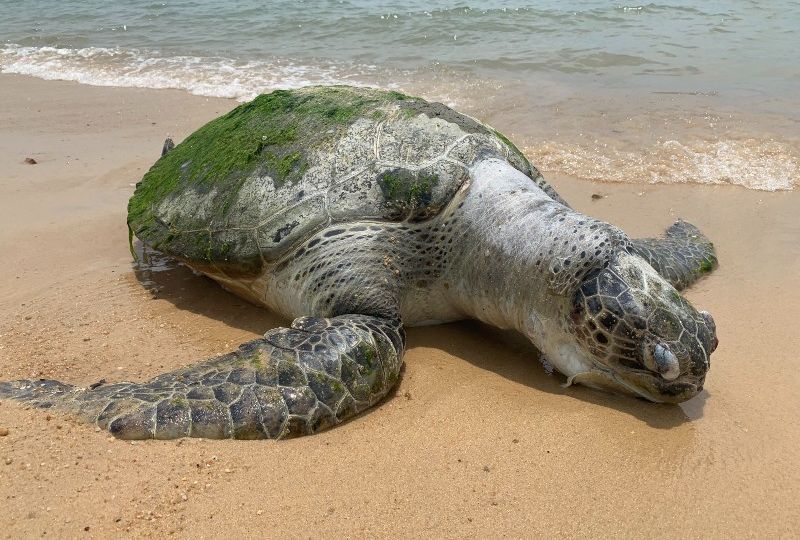Editor’s note: This writer is a volunteer with the wildlife rescue group ACRES.
A rare sea turtle was found washed up on the beach at East Coast Park, and its death could be another sign of Singapore’s plastic waste problem.
A couple strolling down the beach midday Sunday discovered the green sea turtle lying on the shore in front of the National Sailing Centre, and alerted the wildlife rescue group Animal Concerns Research & Education Society, or ACRES. They initially believed that the turtle was still alive after seeing it move about in the surf.
But the turtle was confirmed dead when ACRES arrived, and officers from the National Parks Board, or NParks, later removed the carcass from the beach. There were no visible injuries to the turtle, although the body was bloated and its outer skin had started to peel.
The cause of death was “not determinable,” said Ryan Lee, the group director of NParks’ National Biodiversity Centre, citing the turtle’s advanced state of decomposition. No autopsy was carried out to inspect the animal’s intestines for further clues to what could have killed it.
Green sea turtles are classified as an endangered species.
A local expert said that the turtle could have died due to numerous reasons, including ingesting plastics.
“Ingesting plastics is a possible reason why a large, uninjured turtle such as this would have died,” said Rushan bin Abdul Rahman, a sea turtle ecologist pursuing a doctorate in marine conservation at James Cook University.
Singapore’s waters are polluted with plastic, which turtles often mistake for seaweed or a jellyfish meal. More than half of all sea turtles are believed to have consumed plastic, according to the World Wide Fund for Nature. Plastic bottles were the second most collected marine waste in Singapore in 2019 after cigarette butts.
Eating plastic can block a turtle’s intestines or puncture the intestinal wall and cause internal bleeding, while also imitating the sensation of being full so a turtle neglects to feed and dies of starvation.
The shell of the washed-up turtle was covered in algae, which suggests that it had not had access to a coral reef for a long time, according to Rushan. Turtles visit reefs to have their shells picked clean by fish.
“Given the extent of decay, the bloated neck and tail, the individual must have died a while ago and was floating for a long time before it reached our shores,” he said.
Green turtles, named for the greenish color of their fat rather than their shells, are one of the largest types of sea turtle and the only plant-eater of the family, feeding mainly on seagrass and algae. Their numbers are in decline and they are classified as endangered by the International Union for Conservation of Nature.
Though protected in many parts of the world, including Singapore, green turtles face numerous threats, including the loss of suitable nesting sites, poaching of their eggs, ship strikes, and fishing nets. They are native to Singapore’s waters too, although there is no public information on their population size. A green turtle was sighted off the coast of Lazarus Island last year.
Green turtles typically live up to 70 years, grow up to over a meter long, and weigh upward of 160 kilograms. They like to dig nests at least a meter deep although many of Singapore’s beaches are not deep enough; they are made up of reclaimed land with sandbags beneath the surface, Rushan noted.
If you spot a nesting turtle, NParks’ advice says to avoid making any noise, keep your distance and refrain from using lights and flash photography.
“Touching the turtle may scare or provoke it. Handling the eggs may damage them or introduce bacteria into the nest,” Lee said.
“Light and noise may scare the turtle and cause it to leave without laying any eggs. Also, keep clear of tracks left by the turtle. Researchers use the tracks to identify the species of the turtle and to locate the nest,” he added.
Turtle sightings should be reported to NParks via 1800 471 7300.
Other stories:
Singapore dog trainer feels ‘harassed’ by criticism of shock collars (Video)
Singapore canine school hounded for kicking, choking dogs (Video)





Reader Interactions